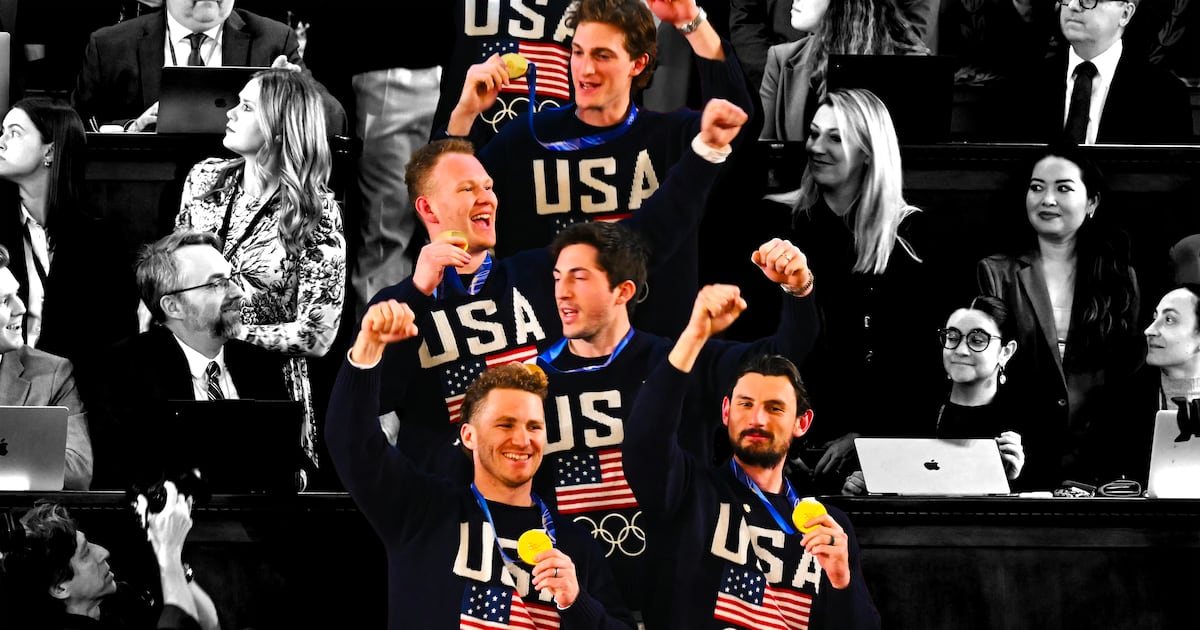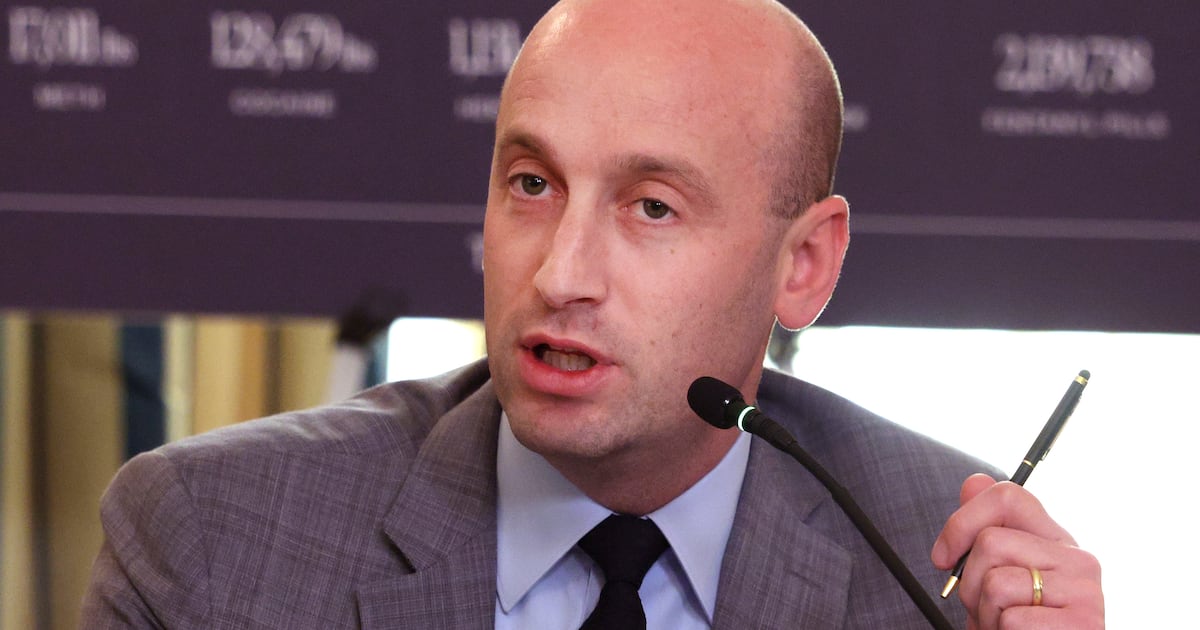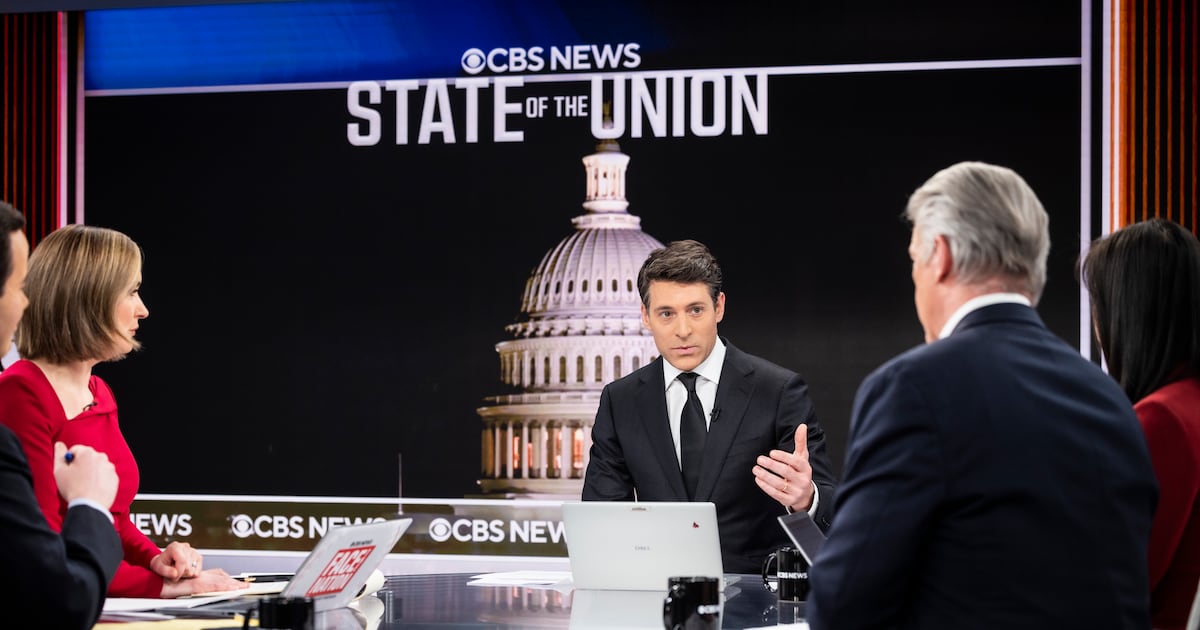You can draw a straight line from Jorge Ramos’s confrontation with Donald Trump to his new documentary Hate Rising, which premieres this Sunday night at 10 p.m. on both Fusion in English and Univision in Spanish.
“The documentary’s origin is precisely that press conference,” Ramos tells The Daily Beast in a new interview the morning after the third and final presidential debate. “Because that’s when I realized that hate is contagious.”
It was late August 2015, just two months after Trump launched his presidential campaign by calling Mexican immigrants “rapists” and criminals, when the Univision anchor and Fusion host stood up at a press conference and tried to ask him about his anti-immigration rhetoric. “Go back to Univision!” Trump shouted at Ramos as his security guards removed him from the room.
Trump later said he was willing to sit down for an interview with Ramos, but never followed through on that promise. More than a year after their press conference clash, Ramos maintains that he was “right to confront Donald Trump right from the beginning,” unlike some other journalists who he believes came to that conclusion much too late in the election cycle.
In the film, Ramos meets with an Imperial Wizard of the KKK on a dark Texas night and watches silently as a group of neo-Nazis in Ohio burn an enormous swastika. Like the Trump supporter who told him to “get out of my country,” white nationalist leader Jared Taylor tells Ramos he doesn’t belong in the United States. “Unless whites are prepared to exclude people, then they will be shoved aside,” Taylor says. It is a position rooted in a deep fear about losing what he views as his rightful place in the social order, and is eerily reminiscent of Trump’s desire to “Make America Great Again.”
Though he did not speak to Ramos for the film, Trump dominates Hate Rising—especially in the exclusive clip below when the host visits a group of children in Texas who fear the prospect of their parents’ deportation should Trump win the presidency. “My dad is from Mexico and if Donald Trump wins, he’s going back to Mexico and we’re going to be separated,” one 8-year-old boy says. This, Ramos tells me, is “The Trump Effect.”
Below is an edited and condensed version of our conversation.
Why did you want to make a documentary about hate groups?
I think hate is contagious. And I think it is very disturbing that there is a rise in the number of hate groups in the United States. I was checking the numbers for the Southern Poverty Law Center and from 2014 to 2015, the number of chapters of organizations affiliated with the KKK grew from 72 to 190. And that’s really concerning. Last year, 20 people were killed by supremacist groups. Last year, 63 mosques were attacked. So clearly something is going on in the country. And I think that what’s happening is that hate groups and neo-Nazis and white supremacists used to live only on the internet; they used to have secret gatherings. That’s not the case anymore. They’re out in the open. They feel emboldened by the rhetoric of Donald Trump. It’s like he has given them permission to speak. And, you know, everybody has prejudices and biases, but before Trump, those biases against immigrants and Muslims and women and people with disabilities were only expressed in homes and bedrooms. Now, they are all over the place. And that’s the difference. So, I knew that something was happening. If you live in big cities like New York, Los Angeles, Miami, Chicago, you might not notice it. But hate is on the rise and I wanted to do a documentary precisely to show that.
The scene where you speak to young children in Texas who fear their parents could be deported is particularly devastating.
Because that’s what’s called “The Trump Effect.” Because we forget that kids listen to everything and watch absolutely everything. When I was talking to these 8-year-olds from a Texas elementary school, they are not following politics as we do. But the impact of this disruptive election on them has been so negative and damaging. Look, for them, they don’t care who’s going to be the next president. But for them, if Trump wins, that means that maybe their parents will be deported and they’ll stay alone or with a neighbor or with another family member. For them, it means separating their families. And as you can see in the documentary, they are really anxious and afraid and nervous about what’s going to happen on Nov. 8. And it’s completely out of their hands. So that’s what’s called The Trump Effect. On the one hand, groups expressing and acting on their prejudices and on the other hand, children and victims suffering from those acts.
One thing that really comes through in the film is how hard it is for you to reason with people who are driven by hatred.
You know, it was incredibly difficult to talk with them. In fact, many of them had no idea that I was going to talk with them. They wouldn’t have permitted that an immigrant like me talk to them. So what we did is, the director of the film, Catherine Tambini, she is the one who contacted them. And many of them thought they were going to be talking to her, not to me. Then right at the end, as it happened with the Imperial Wizard of the KKK group in Texas, I’m the one who sat down. It was incredibly difficult. I have never experienced that kind of racism in front of me. This guy told me that he’s superior to me because he’s white and I’m Latino. And, I don’t know if you noticed, but right at the end he didn’t even want to touch me. He didn’t want to shake my hand. That kind of racism is present. And just imagine: If that happened to a journalist like me who’s on TV, just imagine what happens to people who are not out in the public.
So that was one difficult experience. Another one is I met with a group of neo-Nazis and white supremacists in Ohio, and the producers of the film, they asked me not to say a single word, and I didn’t for three hours. Because it was dangerous for me and for them to be there. It was not a safe space to be an immigrant.
Did you fear that something bad could happen to you in those circumstances?
Of course! On both occasions, in Ohio, I knew that they were armed while they were burning a swastika. And in Texas, I asked if they were armed and they refused to tell me. Of course it was dangerous and I was afraid. Remember, this was happening in private properties—places that are completely isolated. No one is going to be there to defend you if something happens. And you’re meeting with people who hate you. They’ve never met you, but they hate you simply because of who you are.

Why do they hate me? Why do they hate us? In 2024, according to the census, non-Hispanic whites will become a minority, like any other. And they hate the fact that they will become a minority. They hate the fact that minority groups are growing in number and in economic and political power. And that’s exactly what’s happening. They are blaming immigrants, unfairly, but they are blaming immigrants and Muslims and African-Americans for this change in demographics. That’s what they don’t like.
Let’s talk about the third presidential debate. Trump’s use of the term “bad hombres” is getting a lot of attention. What did you make of that?
He’s using a stereotype. And he’s absolutely wrong, because all of the studies that I’ve seen clearly conclude that immigrants are less likely to be criminals, or to be behind bars that those born in the United States. That’s a fact. So he’s using a stereotype and he’s wrong on that. Donald Trump did absolutely everything he needed to do last night to lose the Latino vote. Everything. He insulted immigrants again by calling them “bad hombres,” he suggested that he wants to build a wall. He still wants to deport millions of immigrants. And look, you cannot ask Latinos to vote for him if before that you say, “but I’m going to deport your neighbor, your father, or your brother.” You cannot do that. So he did absolutely everything he needed to do to lose the Latino vote. The last poll that I saw, the NBC/Wall Street Journal poll a few days ago, he only has 17 percent of the Latino vote. With that, he cannot win the White House. It’s impossible. Mitt Romney got 27 percent of the Hispanic vote in 2012 and he lost. McCain got 31 percent in 2008 and lost, too. So with 17 percent it is impossible. The new rule in American politics is you cannot make it to the White House without the Latino vote. And clearly Donald Trump won’t be able to do that.
Can you believe that he even has 17 percent of the Latino vote?
I’m not sure about those polls, either. I’ve met very few Latinos who are supporting Trump, and those are the ones who don’t remember where they come from, or where their families come from.
What did you think when you heard him say he would keep the country in “suspense” as to whether he will accept the election results?
I never expected to hear something like that in the United States. It hasn’t happened. Look, I’ve covered rigged elections in Latin America for decades. I know what a rigged election is, and what’s happening in the United States is not a rigged election. I’ve seen how candidates in Mexico get 100 percent of the vote from a community where nobody gets sick and everybody votes for the same person on Election Day. I’ve seen how in Colombia, a president’s been accused of receiving $6 million from drug traffickers and still win the election. I interviewed Hugo Chavez in Venezuela, who promised me that he would give up power after five years. He changed the Constitution so he could stay for 13 years. So I know what a rigged election is. I have suffered rigged elections in Mexico. And what Donald Trump is disputing is not a rigged election. It is just a candidate who is losing badly on the polls, who is using prejudice and biases to try to win and divide the country. But I was incredibly surprised, because I know what a rigged election is and it is not what’s happening here. And that’s dangerous for American democracy.
It has now been more than a year since Donald Trump had you ejected from his press conference. Has the way you view that incident changed at all since it happened?
No. You know, I think we were right to confront Donald Trump right from the beginning. When he made his racist remarks saying Mexican immigrants were criminals and rapists, we were right as journalists to confront him. And very few journalists saw it that way back then. I still remember being criticized by many, asking me if I was an activist or a journalist. But we were right! When you have someone who’s making racist and sexist remarks, you have to confront him. That is precisely what we do as journalists. When you are confronted with racism, discrimination, corruption, dictatorship, violation of human rights, as a journalist you have to take a stand. And now many journalists are really doing a fantastic job confronting Donald Trump. But we were almost alone last year when we decided to do exactly the same. So I think we did the right thing as journalists.
And, by the way, the documentary’s origin is precisely that press conference—because that’s when I realized that hate is contagious. Donald Trump told me, “Go back to Univision.” Those are code words for saying go back to Mexico. And just a few seconds after he said that, somebody outside the press conference told me, “Get out of my country.” And I just smiled, because this is also my country. I’m also a U.S. citizen. But what was interesting for me in that experience is I realized how contagious hate is. Just a few seconds after Trump had expressed a hateful comment, one of his followers did exactly the same.
Do you think that personal interaction with him changed the way you have covered this presidential race?
You know, actually, we’ve been very critical of Donald Trump since June 16, 2015, when he made those racist remarks about Mexican immigrants. And that confrontation with him only reaffirmed our commitment to demonstrate that he was making racist comments, and to expose him. And by the way, we’ve been continuing that same critical coverage since the beginning. What concerns me is that I understand many journalists are responding correctly to his sexist remarks and to the video from Access Hollywood. And that should be applauded. But where were they when he made those racist remarks about Mexican immigrants. Where were they?
Some journalists have done a really fantastic job, but for many of them, in my point of view, it took them way too long to realize that they had to be more critical to Donald Trump. He was lying from the beginning. He was using stereotypes, making racist and sexist remarks right from the beginning. But many people, it took them too long to react to them. I think we will be judged, as journalists and as voters and as politicians, on how we reacted to Donald Trump. This is a historic election. We’ve never had such a divisive and disruptive election. And we will be asked, “What did you do when you heard that? What did you do when Donald Trump said such inflammatory things? Where were you? Did you ask the questions? Did you talk to your family? Did you report about it? What did you do?” We will be asked those questions on Nov. 9.
What concerns do you have about a Hillary Clinton Administration? Because I know you have also been critical of President Obama.
It’s a legitimate question. Once, during this campaign I moderated a debate between her and Bernie Sanders. And I asked her openly about her emails and about Benghazi. So those are two issues that, even today, still need to be addressed. On immigration, she promised me in that debate that she will not deport children or undocumented immigrants who do not have a criminal record. The Latino community wants to make sure that she will keep her word on that. As you know, Obama didn’t keep his word on immigration reform, so that’s one area of concern. Now, she says that she is going to introduce immigration reform during her first 100 days in office. That’s perfectly fine. But how is she going to do that if Congress is not controlled by Democrats? How is she going to keep her word on that? So those are areas of concern that I have about a possible Hillary Clinton presidency.
Assuming Trump loses, do you think that the type of hate that you explore in the documentary will dissipate or grow stronger?
What I know for sure is that it won’t disappear after Election Day because they feel emboldened, they feel strengthened, they feel validated by his campaign. So no, I don’t think hate will disappear and I don’t think hate groups will disappear after the election, regardless of who wins. And therefore, we truly need a national conversation on hate. And my proposition would be to start with immigration reform. If we can have a national conversation on immigration reform and find some sort of solution for Democrats and Republicans after the election, that would be a great first step. If we don’t do that, hate will continue. Hate is real. Hate is something that you can actually touch. I talked to victims: a Somali immigrant whose face was smashed with a glass of beer because she was not speaking English at the time, or a Mexican immigrant who was brutally attacked by two brothers simply because he was an immigrant. So, no, I don’t think this will end with the election. The damage has been done. And I think it will take many, many years to repair the damage.






